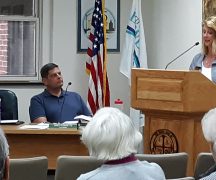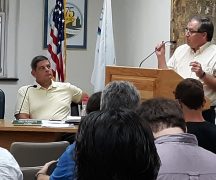By JAN LARSON McLAUGHLIN
BG Independent News
Bowling Green City Council was politely reminded last week about the stalled plans to ban single-use plastic bags in the city.
Three Bowling Green State University students took turns at the podium to urge council to not give up on the plastic bag ban.
Gage Stephens, a member of the BGSU Environmental Action Group, suggested that a small fee for plastic bags could convince more citizens to bring their own reusable bags to stores.
Stephens gave council a “respectful reminder” that having fewer plastic bags could lessen the amount of litter in Bowling Green.
Sara Honeck, also a member of the Environmental Action Group at BGSU, told City Council that BGSU banned the retail use of plastic bags on campus at the beginning of the fall semester. Students were given reusable bags to use rather than plastic bags.
“People are proud to be using them,” Honeck said.
And Adam Swint told council of successful plastic bag bans in other areas.
“If large states like New York and California can do things like this,” then cities like Bowling Green should also be able to, Swint said.
The city’s proposed plastic bag ban was tabled in August, with some members of City Council reluctant to adopt a plastic bag ban that would likely be reversed by the state legislature.
Last December, the Ohio representatives approved House Bill 242, which bans Ohio communities from instituting a tax or prohibition on plastic bags and other single-use items such as straws and cups.
A Republican majority in the Senate seems poised to follow suit. However, Gov. Mike DeWine has made it clear that he opposes a bill that would take away local governments’ rights to make their own decisions on a plastic bag ban.
The home rule clause in Ohio’s constitution allows local governments to enact laws that affect their own municipalities, even if they conflict with state statutes.
A few communities in Ohio have already passed plastic bag restrictions, including all of Cuyahoga County.
Nationwide, more than 200 counties and municipalities in the U.S. have enacted restrictions that either ban the use of plastic bags entirely or levy a fee per bag used.
Private industries have also moved to phase out plastic bags. The Kroger grocery chain announced last year that it would stop using single-use plastic bags at all of its stores by 2025.
According to the Environmental Protection Agency, the United States goes through 380 billion single-use bags a year.
A study by researchers at the State University of New York at Fredonia revealed that Lake Erie has at least 100 million pieces of plastic inside of it. Much of that matter is microplastics, broken down from items like disposable bags and straws.
In other business on Monday evening, City Council:
- Unanimously supported Mayor Mike Aspacher’s recommendation that former council member Bob McOmber be appointed to the city planning commission to fill the seat formerly held by Ryan Holley.
- Learned from Public Utilities Director Brian O’Connell that an insert will be placed in citizens’ utility bills. The insert will explain the new online access for customers to get information on their utility usage, billing estimates and how to lower their utility usage.
- Learned the State of the County address will be held March 11, at 8 a.m., in the atrium of the Wood County Courthouse Complex.
- Heard the State of the City is scheduled for March 25, at 8 a.m., in the newly constructed Veterans Building in City Park.
- Learned that the next public meetings about rental housing have been changed. The March 10 meeting, at 5 p.m., will be to gather more public comments. The March 16 meeting, at 5:30 p.m., is planned as a panel discussion from five landlords in the city.
- Heard a transportation safety committee meeting is scheduled for April 6, at 5 p.m. The meeting will focus on bicycle accommodations on city streets, and a preliminary discussion on high speed rail through Bowling Green.





